
Guests
- Dr. Abdul Basit Khanneurosurgeon volunteering with Rahma Worldwide at the Nasser Hospital in Gaza.
We speak with American neurosurgeon Dr. Abdul Basit Khan in Gaza, where he is volunteering at the Nasser Hospital. He describes treating patients with blast injuries and gunshot wounds from Israeli attacks, all while coping with a lack of basic medical supplies and widespread hunger. “Food insecurity is rampant, from all levels of society. Even the physicians are not eating,” he says. Multiple blasts were heard during the interview, with Dr. Khan describing his patients as people “living in tents being indiscriminately bombed” by Israeli forces. “This is the worst thing I’ve ever seen in my entire life, by far.”
Transcript
AMY GOODMAN: The heat dome in Switzerland, where I just came from, was incredible, and we’re going to talk more about that in a bit with the head of the U.N. high commissioner for human rights. But now to Gaza.
In northern Gaza City on Monday, an Israeli airstrike bombed a popular seaside cafe, killing at least 40 people. The Al-Baqa cafe was a popular destination for Palestinians in Gaza looking for internet access, including journalists. Photojournalist Ismail Abu Hatab was killed. Palestinian journalist Bayan Abusultan was injured in the attack. Also among the dead was prominent visual artist Frans al-Salmi and a group of children celebrating a birthday. Al Jazeera journalist Hani Mahmoud reported the attack on the cafe occurred without any warning, he said.
At least 95 people in Gaza were killed Monday. Separate attacks hit a tent encampment in the courtyard of the Al-Aqsa Hospital in central Gaza and the Yafa School, which have been sheltering hundreds of people. Israeli forces killed at least 15 people seeking food in southern Gaza at a militarized aid distribution site run by the U.S.- and Israeli-backed group, the so-called Gaza Humanitarian Foundation. Fifty others were wounded. This is Hussam Al Hawajri, an eyewitness.
HUSSAM AL HAWAJRI: [translated] Hunger, hunger, hunger! No matter how much I tell you, hunger. There is hunger in Gaza. There is humiliation. This is humiliation. You bring me aid to kill me. You said this is aid, and it is documented and signed. Then, why these massacres? … These people had gone to eat. They went to get a morsel of food to eat. They said they were distributing aid. How do you call it aid, then you shoot at people’s children? Where is the world? Where are the people? You tell me aid, and it’s documented. Then, why do you kill us?
AMY GOODMAN: More than 600 Palestinians have been killed while attempting to seek aid from the so-called Gaza Humanitarian Foundation sites. Already at least 66 Palestinian children have died of acute malnutrition due to Israel’s blockade. That’s according to Gaza officials.
For more on these latest developments in Gaza, we go to Gaza, where we’re joined by Dr. Abdul Basit Khan, who is a neurosurgeon volunteering with Rahma Worldwide at the Nasser Hospital in Khan Younis. He’s an American doctor volunteering in Gaza right now.
Thank you so much for being with us, Doctor. I understand just before we went to air, there was another bomb right near you?
DR. ABDUL BASIT KHAN: Thank you, Amy.
Yes, in fact, there were four bombings just south of the Khan Younis complex, while we were joining the phone call. These are residential areas, indiscriminate bombing. And I’m sure after this call, I’ll go treat the patients in the emergency room.
JUAN GONZÁLEZ: And, Dr. Khan, some of the patients that you’ve been treating, could you talk about the injuries they’re suffering?
DR. ABDUL BASIT KHAN: Yes, definitely. So, I’m a neurosurgeon. I treat brain and spine pathologies.
That was just another bomb.
I’ve been treating mostly blast injuries. My patients are all dislocated and living in tents. They are being indiscriminately bombed by the Israeli occupation forces. My first day here, within two hours of arriving, I operated on a 10-year-old girl who was in her tent and was struck by a bomb. A father said he was outside of the tent. A bomb came from the sky. She became immediately unconscious, came to me. She had shrapnel going through both — ripping through both frontal lobes. I operated on her that night. Thankfully, she’s doing well.
These types of bombings affect entire families. I was later consulted on an adult woman in the ICU who had shrapnel penetrating the front of her neck, causing a large neck hematoma. I was consulted by the head and neck surgeon because there was shrapnel lodged in her spine. That woman turned out to be the mother of the patient I had just operated. The poor father is here going between both ICUs.
These kinds of conditions and these kinds of scenarios are very common. In fact, just before I logged into this call, I took care of one young boy, 8 years old, similar story. In the tent, he has shrapnel ripping through both frontal lobes. We will soon operate the patient, as soon as we have an operating room available. Everything is in resource limitation in Gaza. Then, later, in the emergency room, I took care of his father, who also had shrapnel injury to the back of the head. These are the kinds of patients I’m seeing.
JUAN GONZÁLEZ: A few days ago, Haaretz, the Israeli newspaper, reported that Israeli soldiers, IDF soldiers that they’ve interviewed, said that they were ordered to fire on unarmed crowds near food distribution sites. There’s been over 500 Palestinians killed since May at these food distribution sites. What are your other colleagues talking to you about the kinds of people who have been killed or wounded by gunfire at these distribution sites?
DR. ABDUL BASIT KHAN: It’s an excellent question. The injuries from the aid sites are very common, and we’re seeing these injuries every single day. I, myself, yesterday night, we had a patient come from the aid site in a delayed fashion, after he was struck with shrapnel in the back of the head. The day prior, I had seen a 25-year-old man who had a single gunshot wound with a high-velocity rifle enter in the posterior aspect, back of the neck. They shot him in the back of the neck, and it exited the front part of the chest. It severed his spinal cord. He can no longer move his arms or his legs, and he will remain like that for the rest of his life. He’s only 25 years old.
I reviewed with my colleagues the cases that they’re seeing. One of the cardiologists here, he saw a patient who had been shot in the chest at the aid site and had blood collecting around his heart, preventing his heart from beating. They had to emergently drain the bleeding from around the heart.
One of my colleagues is an orthopedic surgeon. Yesterday, he amputated three limbs of different patients, young, healthy, civilian patients just seeking aid. And you can imagine, it’s very morbid to lose an arm or a leg.
My other colleague is a urologist. He took care of three patients yesterday who were all, separate patients, shot in the scrotum. Two, he operated on, and one, he is managing conservatively. The one he’s managing conservatively is a 7-year-old boy. A 7-year-old boy was with his father in the aid station and was shot in the scrotum.
And unfortunately, one of my colleagues, the cardiologist, saw a patient who was dead on arrival, 7-year-old boy, was shot, multiple gunshots, at the aid station. So, these cases are very common.
AMY GOODMAN: Just to be clear, the medical charity Doctors Without Borders is saying that this Israeli-U.S. food distribution scheme in Gaza is “degrading Palestinians by design, forcing them to choose between starvation or risking their lives for minimal supplies.” With over 500 people killed, nearly 4,000 wounded while seeking aid, MSF says, Médecins Sans Frontières, Doctors Without Borders says, “this scheme is slaughter masquerading as humanitarian aid and must be immediately dismantled.” Dr. Basit Khan, you’re a doctor. I know you can’t talk about politics here, but you are seeing what’s happening right there on the ground. Are your patients, those that are conscience — conscious, talking about having gone to get food?
DR. ABDUL BASIT KHAN: Yes. So, usually, it’s the young adult men that are going to get the food on behalf of the family. Like I said, even 7-year-old boys have gone with their families to attempt to get food. Beyond the patients — it’s not just the patients, Amy. Even the doctors here are suffering from starvation. There’s minimal food available. No one in Gaza is eating meat. I haven’t seen one person eat meat since I’ve arrived.
I’m talking to my neurosurgery colleagues who are native Palestinians living here and working here in Gaza. Their situation is very dire. One of the colleagues told me he lost 50 kilograms — that’s 100 pounds — since the start of the occupation and the war. Food insecurity is rampant from all levels of the society, from the poor to the — you know, even the physicians are not eating.
And this stretches to the patients, as well. The 10-year-old girl that I mentioned, we operated on her the same night she came. Thankfully, she had a good neurological recovery. The next morning, I wanted to start her with tube feeding so she could get some nutrition to recover from her injury. I talked to the pediatric ICU doctor, who is a Palestinian native, who lives in Gaza, has been working here for the entire war. He said, “Yes, I agree with you: We should give the tube feeding. But it’s not available.” There is no tube feeding in the pediatric ICU for the 10-year-old girl in Nasser Hospital in Khan Younis. It’s not available.
AMY GOODMAN: Finally, Doctor, you are an American doctor who works in Houston. You’re a neurosurgeon. What is it like to be there at Nasser Hospital in Khan Younis for you? Does anything in your life experience compare?
DR. ABDUL BASIT KHAN: No. Definitely, this is the worst thing I’ve ever seen in my entire life, by far. You know, I had been following the occupation since the beginning, and you read about the devastation, the destruction, the humiliation, the hunger, the starvation, the death, and even just — it just does not do it justice. Everywhere you look, the hospital overcrowded, families are living in the hospital.
The supplies to do the operations are limited. The Israeli forces will not allow you to bring such supplies in. We’re using single-use items — for example, drill bits and such tools that you’re supposed to dispose of after each use, they’re not available, so we cannot dispose of them. We’re reusing them and reusing them and attempting to sterilize them. The operations that take me maybe 45 minutes to one hour in Houston are taking me two to three hours here in Nasser Hospital.
Nasser Hospital itself was a victim of bombing. There’s no windows in Nasser Hospital because they’ve all been destroyed. There’s no windows, meaning the bugs come into the hospital. You know, all of the operations that I’ve done in the operating room, because there’s no air filtration system left, there are bugs coming into my operating field. This situation is so dire and so unacceptable, I’m totally flabbergasted.
At the same time, I have to really respect and recognize my Palestinian colleagues. You know, I’ve only been here a short time. My Palestinian colleagues, the neurosurgery team here, they are themselves displaced from the European General Hospital, the European Gaza Hospital. They each have been relocated more than seven times each. The doctors are living in the tents, but they still come here. Every other day, they take a 24-hour call, two teams. They have not been paid salary. And they have been managing these patients with such little technology, such little tools, and they’re managing them to a very high degree. So, I really respect and admire my colleagues here. And no, this is the worst thing I’ve ever seen in my whole life.
AMY GOODMAN: Dr. Abdul Basit Khan, thank you so much for being with us, neurosurgeon volunteering at Nasser Hospital in Khan Younis, speaking to him in Gaza, although the Israeli military, the Israeli government, Netanyahu, the prime minister, does not allow international journalists to cover on the ground what’s happening in Gaza unless they are embedded. You can see it is not difficult to speak to people on the ground, and you should call the networks and ask them to do that. It is absolutely critical to understand what Dr. Khan is saying.

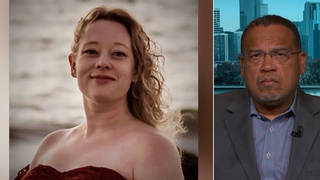
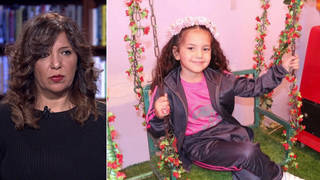
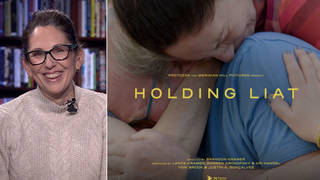
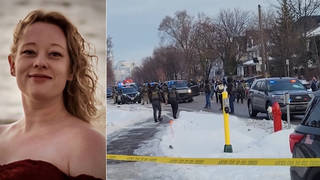
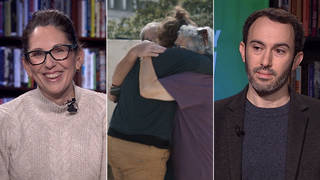

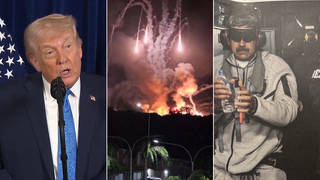
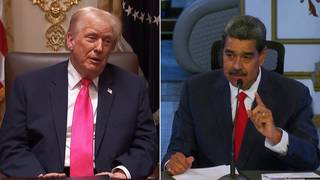


Media Options